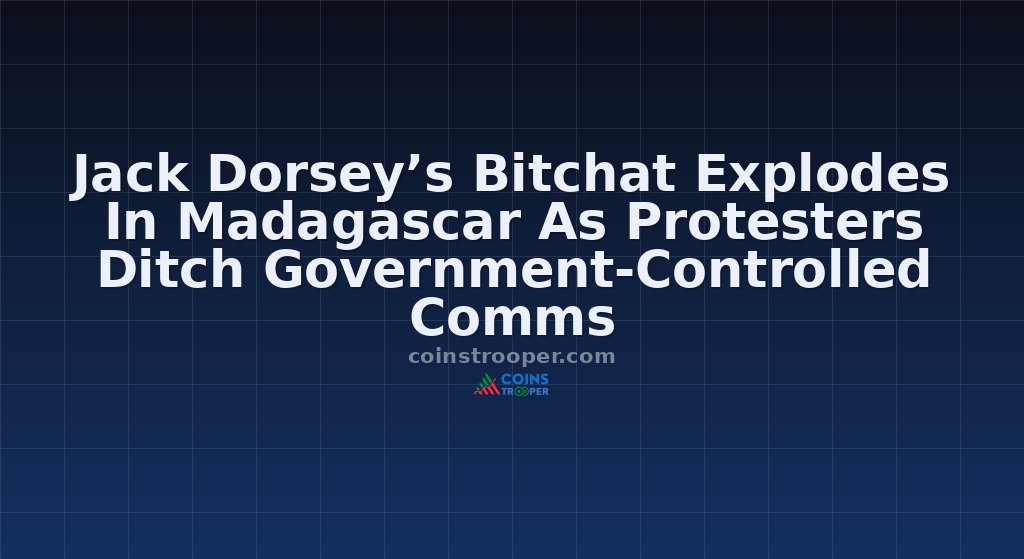Jack Dorsey’s Bitchat Explodes In Madagascar As Protesters Ditch Government-Controlled Comms

- Google Trends data shows “Bitchat” searches spiking from zero to 100 in Antananarivo as protesters sought censorship-resistant communication alternatives.
- Chrome-Stats shows Bitchat has been downloaded 365,307 times since launch, with over 21,000 downloads in the last day and more than 71,000 in the past week.
- The government sacked its energy minister and imposed curfews from 7 PM to 5 AM to restore public order.
- Bitchat adoption in Madagascar follows similar patterns observed during recent protests in Nepal and Indonesia.
What Happened
Chrome-Stats shows Bitchat has been downloaded 365,307 times since launch, with over 21,000 downloads in the last day and more than 71,000 in the past week.
Dorsey launched the beta in July 2025, filling TestFlight’s 10,000 capacity within hours.
Market Context
Jack Dorsey’s decentralized messaging app Bitchat experienced a massive surge in downloads in Madagascar during violent protests over water and electricity shortages, which forced authorities to impose dusk-to-dawn curfews across the capital.
Emergency wipe capabilities, accessible through triple-tap commands, instantly clear local data if devices are compromised or confiscated.
Why It Matters
Google Trends data shows “Bitchat” searches spiking from zero to 100 in Antananarivo as protesters sought censorship-resistant communication alternatives.
Poverty and Infrastructure Crisis Fuel Violent Demonstrations
Details
The peer-to-peer application operates without internet infrastructure using Bluetooth Low Energy mesh networks, allowing encrypted messages to hop between devices within 30-meter ranges.
Protests erupted on Thursday as thousands of mostly young protesters marched through Antananarivo, demanding the restoration of reliable water and electricity services.
Police fired tear gas to disperse crowds who barricaded roads with burning tires and rocks before looting shopping malls, banks, and attacking homes of lawmakers close to President Andry Rajoelina.
The government sacked its energy minister and imposed curfews from 7 PM to 5 AM to restore public order.
Madagascar faces severe poverty, with 75% of its 30 million population living below the World Bank’s poverty line, while only 6.6 million citizens have internet access.
Mesh Networks Enable Communication During Civil Unrest
Bitchat adoption in Madagascar follows similar patterns observed during recent protests in Nepal and Indonesia.
Nepal recorded 48,781 downloads on September 8 as youth-led demonstrations against corruption and social media bans left 22 dead and forced Prime Minister KP Sharma Oli’s resignation.
The application requires no phone numbers, email addresses, or account registration while providing end-to-end encryption through X25519 key exchange and AES-256-GCM protocols.
Each device functions as both a client and a server, creating self-organizing networks that are resilient to centralized attacks or single points of failure.
Messages fragment into 500-byte chunks, enabling transmission across multiple device hops with up to seven relay points.
The store-and-forward system caches messages for offline users up to 12 hours, ensuring delivery even when direct connections are unavailable.
Random peer IDs are generated for each session, protecting user privacy while eliminating the need for persistent identifiers.
The weekend project focuses on disaster coordination, event overflow communication, and building cross-community bridges during internet shutdowns or government censorship campaigns.
Western Governments Target Encrypted Communications Simultaneously
The European Union advances its controversial “Chat Control” regulation, which requires messaging apps to scan every message, photo, and video before encryption.
Fifteen EU countries currently support the proposal, though it falls short of the 65% population threshold required for passage.
The Child Sexual Abuse Regulation mandates client-side scanning where software checks content on user devices before transmission.

